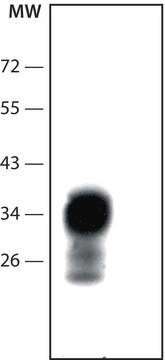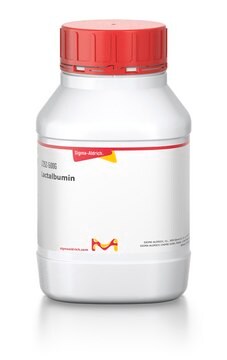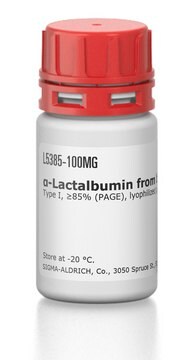AG210
Prion Protein, recombinant
Synonym(e):
PrP, CD230
Anmeldenzur Ansicht organisationsspezifischer und vertraglich vereinbarter Preise
Alle Fotos(1)
About This Item
UNSPSC-Code:
12352203
eCl@ss:
32160702
NACRES:
NA.26
Empfohlene Produkte
Biologische Quelle
bovine
Qualitätsniveau
Assay
>95% (total protein)
Form
liquid
Hersteller/Markenname
Chemicon®
Methode(n)
cell based assay: suitable
NCBI-Hinterlegungsnummer
UniProt-Hinterlegungsnummer
Versandbedingung
dry ice
Angaben zum Gen
bovine (calf) ... PRNP(281427)
Allgemeine Beschreibung
Histidine-tagged full-length mature part of bovine PrP (25-244) is expressed in E. Coli BL21, solubilized from inclusion bodies in 6 M guanidine-HCl, and purified by Ni(II)-nitriloacetate agarose chromatography followed by reversed-phase HPLC (C4 column)
Prion diseases or transmissible spongiform encephalopathies are neurodegenerative diseases that affect both humans and animals (Prusiner 1998). All prion diseases share the same molecular pathogenic mechanism that involves conversion of normal cellular prion protein (PrPc) into a form that is insoluble in non ionic detergent and partially resistant to proteases (PrPSc) (Pan et al. 1993). Both PrPSc and PrPc are encoded within a single exon of a chromosomal gene as a protein of ~ 250 amino acids (Basler et al. 1986). Many mammalian PrPs have a 22 amino acid N-terminal signal sequence (Hope et al. 1986; Turk et al. 1988) and 23 amino acid C-terminal signal sequence encoding for attachment of a glycosylphosphatidylinositol anchor (Stahl et al. 1987, 1990). The mature protein of 209 amino acids contains one disulfide bond (Turk et al. 1988) and has two sites of asparagine-linked glycosylation (Endo et al. 1989; Oesch et al. 1995).
Anwendung
Research Category
Neurowissenschaft
Neurowissenschaft
Research Sub Category
Neurodegenerative Krankheiten
Neurodegenerative Krankheiten
Antigen in standard immunochemical detection of BSE.
Optimal working dilution must be determined by the end user.
Optimal working dilution must be determined by the end user.
Physikalische Form
Liquid in 10 mM sodium acetate buffer, pH 4.0, containing 0.01% sodium azide.
Lagerung und Haltbarkeit
Maintain at -20°C in undiluted aliquots for up to 6 months after date of receipt. Avoid repeated freeze/thaw cycles.
Hinweis zur Analyse
The PrPc appears as a single band of about 27 kD by SDS-PAGE
Rechtliche Hinweise
CHEMICON is a registered trademark of Merck KGaA, Darmstadt, Germany
Haftungsausschluss
Unless otherwise stated in our catalog or other company documentation accompanying the product(s), our products are intended for research use only and are not to be used for any other purpose, which includes but is not limited to, unauthorized commercial uses, in vitro diagnostic uses, ex vivo or in vivo therapeutic uses or any type of consumption or application to humans or animals.
Lagerklassenschlüssel
12 - Non Combustible Liquids
WGK
WGK 2
Flammpunkt (°F)
Not applicable
Flammpunkt (°C)
Not applicable
Analysenzertifikate (COA)
Suchen Sie nach Analysenzertifikate (COA), indem Sie die Lot-/Chargennummer des Produkts eingeben. Lot- und Chargennummern sind auf dem Produktetikett hinter den Wörtern ‘Lot’ oder ‘Batch’ (Lot oder Charge) zu finden.
Besitzen Sie dieses Produkt bereits?
In der Dokumentenbibliothek finden Sie die Dokumentation zu den Produkten, die Sie kürzlich erworben haben.
Purification and properties of the cellular and scrapie hamster prion proteins.
Turk, E, et al.
European Journal of Biochemistry, 176, 21-30 (1988)
Scrapie and cellular PrP isoforms are encoded by the same chromosomal gene.
Basler, K, et al.
Cell, 46, 417-428 (1986)
Prions.
Prusiner, S B
Proceedings of the National Academy of Sciences of the USA, 95, 13363-13383 (1998)
Identification of glycoinositol phospholipid linked and truncated forms of the scrapie prion protein.
Stahl, N, et al.
Biochemistry, 29, 8879-8884 (1990)
Scrapie prion protein contains a phosphatidylinositol glycolipid.
Stahl, N, et al.
Cell, 51, 229-240 (1987)
Unser Team von Wissenschaftlern verfügt über Erfahrung in allen Forschungsbereichen einschließlich Life Science, Materialwissenschaften, chemischer Synthese, Chromatographie, Analytik und vielen mehr..
Setzen Sie sich mit dem technischen Dienst in Verbindung.








